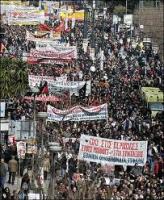Here are some immediate thoughts. They include how we on the international and internationalist Left might respond. As well as what in my opinion we should say:
After Syriza's Victory

Syriza’s electoral triumph has brought hope to the European radical Left and workers’ movement, offering it an immense opportunity. We can also put that the other way around – to fail this test could have incalculable consequences.
A few quick remarks on the first difficulties and problems we face:
Austerity, Collapse, and the Rise of the Radical Left in Greece
 This article and its title are based on a presentation made at the Mapping Socialist Strategies Conference, hosted by the Rosa Luxemburg Stiftung–New York Office at the Edith Macy Conference Center, New York, August 1-4, 2014.
This article and its title are based on a presentation made at the Mapping Socialist Strategies Conference, hosted by the Rosa Luxemburg Stiftung–New York Office at the Edith Macy Conference Center, New York, August 1-4, 2014.
Economic and Ecological Crisis in Greece
Many misconceptions still exist in the mainstream about the ongoing economic crisis in Southern Europe. First, the crisis is often considered a direct result of the 2008 banking sector collapse in the United States, but it is becoming abundantly clear that it is a by-product, an expected outcome, of the current economic system, capitalism, which relies on continuing growth and competition, profit maximization, power and wealth accumulation by the oligarchy, commodification of public goods and resources, and the voracious exploitation of the environment.
Homer and War
 The following is a response to an article trying to enlist the poet Homer on the side of hawks by the Boston Globe’s resident neocon right winger Jeff Jacoby. This letter was not published.
The following is a response to an article trying to enlist the poet Homer on the side of hawks by the Boston Globe’s resident neocon right winger Jeff Jacoby. This letter was not published.
Another International Labour Movement is Necessary
[New Politics readers will be interested in the following article by Dan Gallin, who advocates social justice unionism, international solidarity and the need for workers' movements that actually move.
The Double Standard in Europe's Austerity Discourse
The International Monetary Fund acknowledged making an egregious error in its evaluation of the Greek bailout it helped create after its ambitious push for harsh austerity last month. Their failed analysis highlights the dangers of austerity measures imposed on Greek citizens. According to the IMF report:
Letter of Support and Solidarity to Greek Transport Workers
The following open letter was issued yesterday.
January 26, 2013
Letter of Support and Solidarity to Greek Transport Workers
We have read about your strike against threatened pay cuts and the Greek government’s emergency decree and use of riot police to force you back to work. We are horrified by the attempt to toss your contracts aside; your pay is already not adequate to maintain a decent standard of living.
The State of Anti-Austerity Struggles in Greece
 In recent years Greece has come to exemplify the attempt of capitalist elites to respond to the global capitalist crisis through an attack on the rights and living standards of workers and ordinary citizens around the world.
In recent years Greece has come to exemplify the attempt of capitalist elites to respond to the global capitalist crisis through an attack on the rights and living standards of workers and ordinary citizens around the world.
We Stand with the Greek People Fighting Austerity, For Their Sake and Ours
 SEPTEMBER 2012—What is happening today in Greece is only the most extreme example of a global phenomenon: the world’s political and economic elites, who are responsible for the current economic crisis, want to make the rest of us pay for that crisis, no matter how much suffering this creates.
SEPTEMBER 2012—What is happening today in Greece is only the most extreme example of a global phenomenon: the world’s political and economic elites, who are responsible for the current economic crisis, want to make the rest of us pay for that crisis, no matter how much suffering this creates.
The Greek Grassroots Challenge to the Politics of Austerity
Harrison and Landy recently returned from a trip to Greece, where they met with activists and others to gain a better understanding of the popular upsurge against the Greek government’s austerity program.
The Greek and the European Crisis in Context
At the beginning of the new millennium, Greece, a weak, peripheral nation in the European economy, was still licking its wounds from the greatest politico-financial scandal in its post-war history — the collapse of the Athens stock exchange. The wild stock market speculation had been fuelled by often-repeated statements from various government officials (with Finance Minister Yiannos Papantoniou leading the chorus) that the upward trend was an accurate reflection of the robust state of the real economy.
The Greek and the European Crisis in Context
AT THE BEGINNING OF THE NEW MILLENNIUM, Greece, a weak, peripheral nation in the European economy, was still licking its wounds from the greatest politico-financial scandal in its post-war history — the collapse of the Athens stock exchange. The wild stock market speculation had been fueled by often-repeated statements from various government officials (with Finance Minister Yiannos Papantoniou leading the chorus) that the upward trend was an accurate reflection of the robust state of the real economy.
